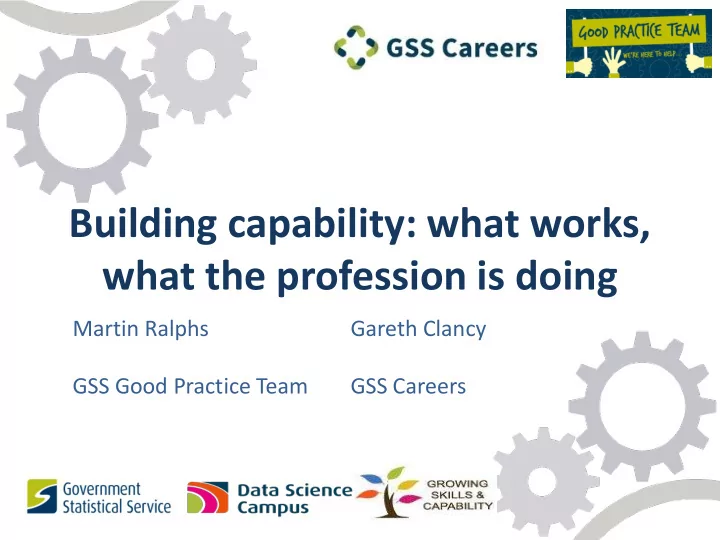

Building capability: what works, what the profession is doing Martin Ralphs Gareth Clancy GSS Good Practice Team GSS Careers
Menu • A bit of context • The Analysis Function • Career and learning pathways - Statistics Profession and beyond • Capability building from the ground up – actions and activities you can do yourself
“I fully expect that, in five years’ time, what we will be doing will be radically different . More data will be real-time ; our services will be digital by default ; the quality of our advice and insight will have earned us a seat at the table where the most important decisions are made. ”
‘Getting data right is the next phase of public service reform’ John Manzoni Government Data Science Partnership
The Government Data Programme Better Use of Data : Data Policy : Data Infrastructure : Open Data Legislation Registers Common Approaches Data Science Data Access Tools, APIs Data Literacy & Capability International Leadership
Creation of the Analysis Function “Better Analysis, Better Delivery” • A new Function? Or an evolution of the Analysis Professions • Part of the wider Civil Service Functional agenda set out by John Manzoni • Ambitious aims for Careers, Learning and Impact
Analysis Function Objectives 1. Visibility & Impact 2. Build and coordinate common capabilities 3. Radically improve Civil Service capability in Analysis and Data Science 4. Management models and career pathways for analysts 5. Strengthen talent and diversity for analysts to deliver the Function’s mission and Civil Service Leadership Statement
Analysis Career Pathway Principles 1. Achieving impact with analysis 1.Technical skills 2. Knowledge and application of OR skills and 2.Using and promoting techniques social research 3. Sustaining and developing OR profession and professionalism Better Statistics, Better Decisions 1. Acquiring Data / Understanding 1. Application of knowledge User Needs 2. Analysis of Data 2. Data Analysis 3. Effective communication 3. Dissemination and Presentation 4. Working with Credibility
Career Pathway Principles Guidance on entry, progression and development within the profession Underpinned by learning and development opportunities from formal to informal Different skills' families (technical and non-technical) that government statisticians should develop Data Science and data scientists are part of the Statistics Profession The pathway sets will be applicable across the GSS. Department- specific opportunities and standards will not be included
Consultation with Statistics profession 3 month plan to develop consistency across professions and recognise technical skills Gss.career.strategy@ons.gov.uk
Linking Careers to Learning 1. Career and Learning needs to be outward facing to meet the needs of Better Statistics, Better Decisions, Analysis Function and Civil Service work plan 2. Partnering with Policy, Digital and Leadership Academies 3. Data Science Learning Offer gss.career.strategy@ons.gov.uk
The analyst’s toolbox is changing
The ask of analysts is changing Focus on the Agile and Data driven repeatable and Communicate flexible transparent Be curious Experiment Show your Share, discuss about and innovate, workings and critique and if it doesn’t information and explore it fully work move on Design for Find the stories in quality your data and Seek out new Use tools and assurance, share them ways to add techniques transparency value to your that fit the and Seek challenge to department’s problem repeatability improve data processes and outputs
What can you do about this? • Build from the ground up as well as from the centre • As a professional community, we need to transform our skills and how we work to meet the future needs of government • We are already doing this across government – don’t wait, get involved!
What do we need?
Frame this as “skills to save” Code clubs, reading groups, lunchtime teach-ins Use your 5 days a year and CPD time Try to sell a “free time” pilot. Use demonstrator projects to “show the thing”, raise awareness and demonstrate possibilities – this will generate excitement and interest Work across the professions to build mentoring and information sharing networks – start an “in house” accelerator? Build data science learning into your delivery (e.g. RAP) Use open source tools to improve efficiency of processing and drive down licensing costs
Use success stories from OGDs to demonstrate benefits and savings. Show that others have brought new tools in and realised business benefits If you can’t get the tools you need, lobby your Head of Profession, Chief Analyst and other senior managers to get them into your organisation – but they’ll need evidence! Share the good stuff as widely as you can within your organisation Build alliances with the like minded – invite external speakers to show how they’ve used these tools in government to deliver meaningful change – GPT and the Data Science Partnership can help you here
Some departments are heading into the cloud REMEMBER: You can do a LOT OF DATA SCIENCE on a LAPTOP At ONS, we built our own private cloud as a proof of concept and used it as the basis for lots of pilot studies – we needed to get the Executive Director for IT on board to let us do that Having a senior team who can see and support the benefits of open source and are bought into “skills to save” is a huge advantage Four years later, we’re now transitioning to something bigger, better and properly embedded in our business transformation If all else fails, get some standalone machines to test things out with. Use them to build support for further progress!
Recommend
More recommend